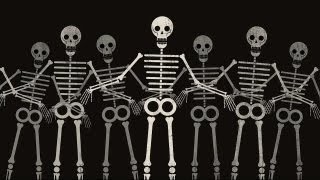(单词翻译:单击)
Take an adjective such as 'implacable,'or a verb like 'proliferate,' or even another noun, 'crony,'
拿一个形容词'implacable'(难以平息的),或者动词'proliferate'(增值),或者是名词'crony'(密友)
and add a suffix, such as '-ity,' or '-tion,' or '-ism.'
然后帮它加上一个后缀,例如'-ity','-tion'或者'-ism'。
You've created a new noun. 'Implacability,' 'proliferation,' 'cronyism.' Sounds impressive, right?
你便创造了一个新的名词,'无法改变性','增值现象','亲信主义'。听起来很厉害,对吗?
Wrong! You've just unleashed a flesh-eating zombie.
错!你只是放出了一只肉食僵尸。
Nouns made from other parts of speech are called nominalizations. Academics love them.
将其它词性词语变成名词的过程称之为名词化。专业学者们很喜欢它们。
So do lawyers, bureaucrats, business writers.
律师,官员和商业作家们也很喜欢。
I call them zombie nouns, because they consume the living.
我称之为僵尸名词,因为它们会消耗生命。
They cannibalize active verbs, they suck the lifeblood from adjectives, and they substitute abstract entities for human beings.
它们蚕食活跃的动词,它们从形容词里吸取生机,它们代替人类抽象的实体。
Here's an example.
这里是一个例子。
'The proliferation of nominalizations in a discursive formation may be an indication of a tendency towards pomposity and abstraction.' Huh?
'散乱形式的名词化增值可能是重要性和抽象性的倾向程度的一种暗示',哼?
This sentence contains no fewer than seven nominalizations, yet it fails to tell us who is doing what.
这个句子里面包含了不下七个名词化现象,然而它却没能告诉我们谁在干什么。
When we eliminate, or reanimate, most of the zombie nouns, so 'tendency' becomes 'tend,' 'abstraction' becomes 'abstract,'
当我们排除,或者复苏大部分的'僵尸名词',那么'倾向程度'变成'倾向','抽象概念'变成'抽象'
then we add a human subject and some active verbs, the sentence springs back to life.
然后我们再加入一个人类的主语和一些活跃的动词,这个句子就重新有了生命。
'Writers who overload their sentences with nominalizations tend to sound pompous and abstract.'
'那些在句子里过度使用名词化的作家会使他们的句子听起来重要和抽象'。
Only one zombie noun -- the key word 'nominalizations' -- has been allowed to remain standing.
只有一个僵尸名词 -- 关键字'名词化'被允许保持不变。
At their best, nominalizations help us express complex ideas, perception, intelligence, epistemology.
名词话的好处是帮助我们表达复杂的概念,看法,智慧,认识论。
At their worst, they impede clear communication.
在最坏的情况下,它们妨碍了清楚的交流。

To get a feeling for how zombie nouns work, release a few of them into a lively sentence and watch them sap all its energy.
去感知僵尸名词是如何运作的,那就把几个僵尸名词放到一句生动的句子里,然后看着它们使所有的能量衰竭。
George Orwell played this game in his essay 'Politics in the English Language.'
乔治·奥威尔在他的论文'英语语言里的政治'里玩了这个游戏。
He started with a well-known verse from the book of Ecclesiastes in the Bible.
他先从圣经传道书里著名的一段段落中开始。
It says 'I returned and saw under the sun, that the race is not to the swift, nor the battle to the strong,
它说:'我又转念,见日光之下,快跑的未必能赢,力战的未必得胜,
neither yet bread to the wise, nor yet riches to men of understanding, nor yet favor to men of skill;
智慧的未必得粮食,明哲的未必得资财,灵巧的未必得喜悦;
but time and chance happeneth to them all.'
所临到众人的,是在乎当时的机会。
Now here's Orwell's modern English version.
这个是奥威尔的现代英语版本。
'Objective considerations of contemporary phenomena compel the conclusion that
'对当前现象的客观考虑强制得出的结论是,
success or failure in competitive activities exhibits no tendency to be commensurate with innate capacity,
竞争活动的成败并不与先天能力相称,
but that a considerable element of the unpredictable must invariably be taken into account.'
而总是必须考虑相当分量的不可预料事件。'
The Bible passage speaks to our senses and emotions with concrete nouns,
这一圣经的段落,用实在的名词与我们的感知与感情直接对话,
descriptions of people, and punchy, abstract nouns such as 'race,' 'battle,' 'riches,' 'time,' 'chance.' Not a zombie among them.
对人的描述,和强烈、抽象的名词,比如'竞争跑','战斗','富有的人','时间','机会'。它们之中没有一个僵尸。
Orwell's satirical translation, on the other hand, is teeming with nominalizations and other vague abstractions.
奥威尔的讽刺性翻译,在另一方面,充满了名词化词语和其它含糊的抽象概念。
The zombies have taken over, and the humans have fled the village.
僵尸占领了村庄,人类逃离了村庄。
Zombie nouns do their worst damage when they gather in jargon-generating packs and swallow every noun, verb and adjective in sight.
僵尸名词在结合了专业名词之后,发挥最大的破坏力,它们吞噬每一个能见的名词,动词和形容词。
So 'globe' becomes 'global,' becomes 'globalize,' becomes 'globalization.'
所以'球'变成了'全球',变成了'全球化',再到'全球化现象'。
The grandfather of all nominalizations, antidisestablishmentarianism,
'antidisestablishmentarianism'是所有名词化的祖先
contains at least two verbs, three adjectives, and six other nouns inside its distended belly.
在它那膨胀的胃里,包括至少两个动词,三个形容词和六个其它的名词。
A paragraph heavily populated by nominalizations will send your readers straight to sleep.
一个包含过多的名词化词汇的段落会让你的读者们直接睡着。
Rescue them from the zombie apocalypse with vigorous verb-driven sentences that are concrete and clearly structured.
用实在的、简洁的、以动词为主的、结构清晰的句子把它们从这个僵尸末日中拯救出来吧。
You want your sentences to live, not to join the living dead.
你希望你的句子是有生命的,而不是加入行尸走肉。


